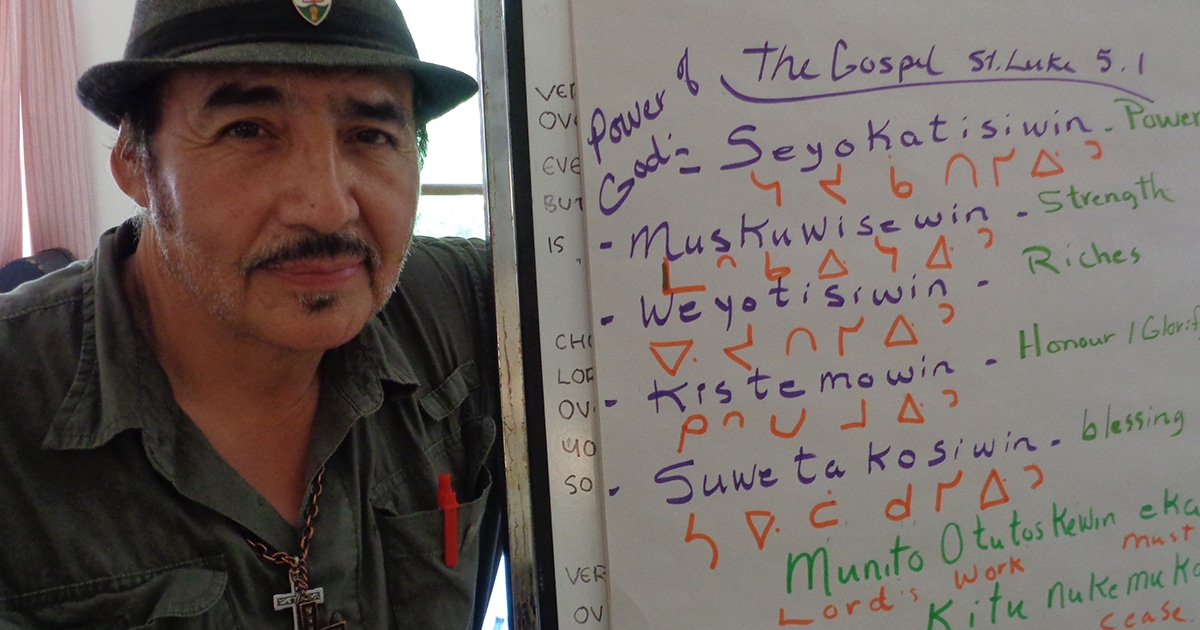Raised by his grandparents in northern Saskatchewan, the Rev. Samuel Halkett never attended a residential school.
“I was one of the lucky ones,” said Halkett, who grew up speaking Cree and worked as a Cree language instructor before becoming an Anglican priest. “That’s the only language I knew,” he added. “And it’s the culture I lived through with my grandparents.”
Tragically, the ability to speak one’s own language was a right denied to many survivors of the Indian residential school system, a number of which were run by the Anglican Church of Canada until 1969.
The Anglican Healing Fund recently granted $10,530 to support the Cree Language Healing Project in which Halkett serves as the main language instructor. Based out of the Cathedral Church of St. Alban’s the Martyr in Prince Albert, Sask., the project—initiated by former rector Ken Davis and now in its third year—provides weekly Cree language instruction and is available to all members of the community.
Participants come from a diverse range of backgrounds, both non-Indigenous and Indigenous—including Cree, Dene, and Métis. But the project is mainly geared to are those who lost their language while attending the residential schools and the generations who have since been impacted—a group that includes many young parents.
Reflecting the intergenerational trauma of the residential school system, many parents were unable to pass on knowledge of traditional language and culture to their own children.
“It hurts the children that are denied … their language, and they’re denied the ways of our elders in the past,” Halkett said. “And I think it’s important to know where we come from in order for us to know where we’re heading.”
The Cree Language Healing Project teaches the y dialect of the Plains Cree, the most prevalent Cree dialect in the Prince Albert area. Numerous Cree dialects exist, with Halkett himself originally speaking the th dialect of the northern Woods Cree.
Each weekly meeting starts with an evening meal before language instruction proper.
For Halkett, language and culture cannot be separated, and he considers hands-on cultural activities the “most powerful” way that he teaches Cree. Music is an important teaching tool, with the instructor regularly breaking out a guitar and leading participants in Cree-language songs.
Other cultural forms such as puppet shows find particular appeal for young children in the class.
“The exciting part [for] children is when they come out there and they see these puppets talking Cree,” Halkett said with a chuckle.
The Cree Language Healing Project saw an estimated 87 people take Cree language instruction in its first year, Halkett said. Current average weekly attendance is approximately 20 students.
Chris Lyons, treasurer at St. Alban’s, said informal feedback from parish members suggested that the language project “has done what it was intended to do” by encouraging language and having “people feel connected and welcome in the Anglican Church”.
The Anglican Healing Fund grant application from St. Alban’s provided a stated completion date of March 31, 2017, but the cathedral is optimistic that the project will remain an ongoing endeavour.
“We’re hoping to continue with it,” Lyons said. “Much of the funding for the program itself has come as a result of the grant from the Anglican Church [through] the [Healing and] Reconciliation Fund … We’ve had some preliminary discussions about self-financing the program, because we do see it certainly as significant outreach for our parish into the larger community, plus providing a service [and] bringing people into our parish.”
The pride that flows from being able to speak in one’s own language may be the most significant and long-lasting benefit, as native Cree speaker Halkett can attest.
“For me to carry something like that with me in all my days of my life, I feel so proud of that,” Halkett said.
“When there’s that identity that comes in, there’s pride that comes with it, with the language. And that’s what I’m really focusing on [now], especially young families.”
Interested in keeping up-to-date on news, opinion, events and resources from the Anglican Church of Canada? Sign up for our email alerts .

